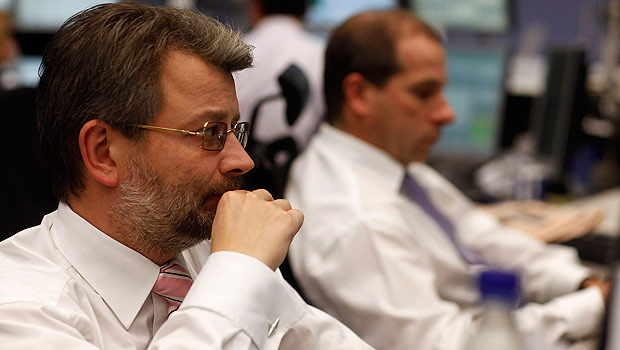For a second day running, market concern has centered on the state of the banks following UniCredit’s announcement Wednesday that it was selling new shares at a 69 percent discount to Tuesday’s closing price.
UniCredit, Italy’s biggest bank, is trying to raise 7.5 billion euros ($9.7 billion) to meet new European requirements for banks to thicken their financial cushions against possible losses. UniCredit’s share price slid over 10 percent for the second straight day.
Italy, the recent focus of the debt crisis, must borrow to cover 53 billion euros ($69 billion) in expiring debt in the first quarter alone in debt auctions beginning Jan. 13. That will test whether the government of new Prime Minister Mario Monti is making progress in regaining market confidence through budget cuts and efforts to improve weak economic growth.
Banks are an integral part of the debt crisis because they hold government bonds. A default or steep fall in the value of government bonds could inflict heavy losses on banks and choke off credit to the European economy. That’s why regulatory authorities want Europe’s banks to raise their buffers by 115 billion euros (149 billion) over the next few months.
The worry in the markets is that banks will have to offer sharp discounts.
The economic slowdown will also keep pressure on lenders in Europe. Spain’s economy minister told the Financial Times he expects the country’s banks to have to set aside another 50 billion euros in provisions to cover the costs of bad property loans. The comments caused Spanish banks stocks to slide and contributed to losses in other countries.
“The Unicredit rights issue proving that recapitalising banks via the normal route will be exceedingly difficult, if not impossible,” said Louise Cooper, markets analyst at BGC Partners.
Most of the attention over Europe’s debt crisis centers on how governments raise cash.
France became the latest euro country to sell off a large chunk of bonds in a relatively troublefree manner, though its borrowing rates edged up and demand slipped from earlier auctions. France’s bond markets are a particular focus for investors because credit ratings agencies have threatened to cut the country’s cherished triple-A rating.
In total, France sold 7.96 billion euros ($10.31 billion)of its bonds at affordable rates. Of the issues on offer, most interest centered on the 4 billion euros in ten-year notes, for which the results were mixed. It had to pay a rate of 3.29 percent, up from December’s equivalent rate of 3.18 percent, and demand was lackluster — the bid to cover ratio, a gauge of investor demand, was only 1.643 as against 3.046 last time.
Germany had also seen a drop in demand for its bond issues this week, with demand for €4.06 billion of its ten-year bonds issued on Wednesday only barely covering what was on offer.
As investors’ risk appetite waned, following a surprisingly buoyant start to the year, the euro took a battering. Weaker than expected eurozone industrial orders in October — up just 1.8 percent after September’s dramatic 7.8 percent decline — helped send the euro down to $1.2784, its lowest level since September 2010.
European stocks likewise fell. Germany’s DAX closed down 0.3 percent at 6,095.99 while the CAC-40 fell 1.5 percent to 3,144.91. The FTSE 100 index of leading British shares was 0.8 percent lower at 5,624.26. Italy’s FTSE MIB underperformed, trading 3.7 percent lower, as it continued to suffer the fallout from UniCredit’s pricing of its rights issue.
US stocks fell too despite a raft of positive US economic data Thursday. Particularly of note was a report from the ADP payrolls firm showing that the private sector employed a forecast-busting 325,000 more people during December. The rise was the biggest in the survey’s 11-year history.
The figures, along with a 15,000 fall in jobless claims last week, have reinforced hopes that Friday’s closely-watched nonfarm payrolls data for December will be strong. The payrolls numbers often set the market tone for a week or two after their release. The expectation is that the US economy generated around 150,000 jobs during December.
Despite those hopes, which have helped markets get off to a positive start in 2012, US markets were down — the Dow Jones industrial average down 0.4 percent at 12,370 while the broader Standard & Poor’s 500 index fell 0.2 percent to 1,275.
“It looks like it will take a much-better-than-expected US employment number on Friday to try and revive the post-Christmas rally in shares,” said David Jones, chief market strategist at IG Index.
Earlier in Asia, Japan’s Nikkei 225 index fell 0.8 percent to close at 8,488.71. South Korea’s Kospi index lost 0.1 percent at 1,863.74, while Hong Kong’s Hang Seng Index rose 0.5 percent to 118,813.41. Benchmarks in Singapore and Taiwan were also higher.
Mainland China’s benchmark Shanghai Composite Index lost 1 percent to 2,148.45, its lowest level in almost three years. The Shenzhen Composite Index lost 3.5 percent to 813.99. More than 100 companies plunged to the daily limit of 10 percent.
Oil prices tracked equities lower even though the EU countries are beginning the process of trying to thrash out an agreement on banning the purchase of Iranian oil in the hope of choking off funding for the country’s nuclear program — benchmark oil for February delivery fell 84 cents to $102.38 per barrel in electronic trading on the New York Mercantile Exchange.
The contract rose 26 cents to end at $103.22 per barrel on the Nymex on Wednesday.










